Felicia Gonzalez Brown
Felicia Gonzalez Brown (She/Her) is the director of the award-winning documentary, She Saved Me (2021, US). After establishing herself as a bicoastal filmmaker in the United States, she moved to Northern Ireland and completed her MA in film. Felicia has directed the psychological thriller Lapse (2022, UK), the multi-cam sitcom The Adventures of Firebolt (2022, UK) and the heart-warming LGBTQIA+ drama Vision of Love (2023, UK).
As a filmmaker, in front of and behind the camera, Felicia thrives on pushing the boundaries of her range and exploring the depth of her characters. Prior to directing, Felicia Gonzalez Brown was an actor in TV, film and commercials. She is driven to express her distinct voice to elevate the needs of underrepresented communities. Felicia's training and experience as an actor has helped her to instinctually support and highly respect the actor's process as a director.
Your project has entered our festival. What is your project about?
Vision of Love subverts the standard filmic formula by centering Sonia's experience as a LGBTQIA+ womxn searching for unconditional love and belonging and indulges in her joy and healing, rather than her trauma. It is a love letter to found family and a tribute to the work of generational cycle-breaking. Vision of Love follows Sonia on a journey to her hometown of Belfast, Northern Ireland, in hopes of reconciliation with her mother, following the news of her father's death all while preparing for her wedding.
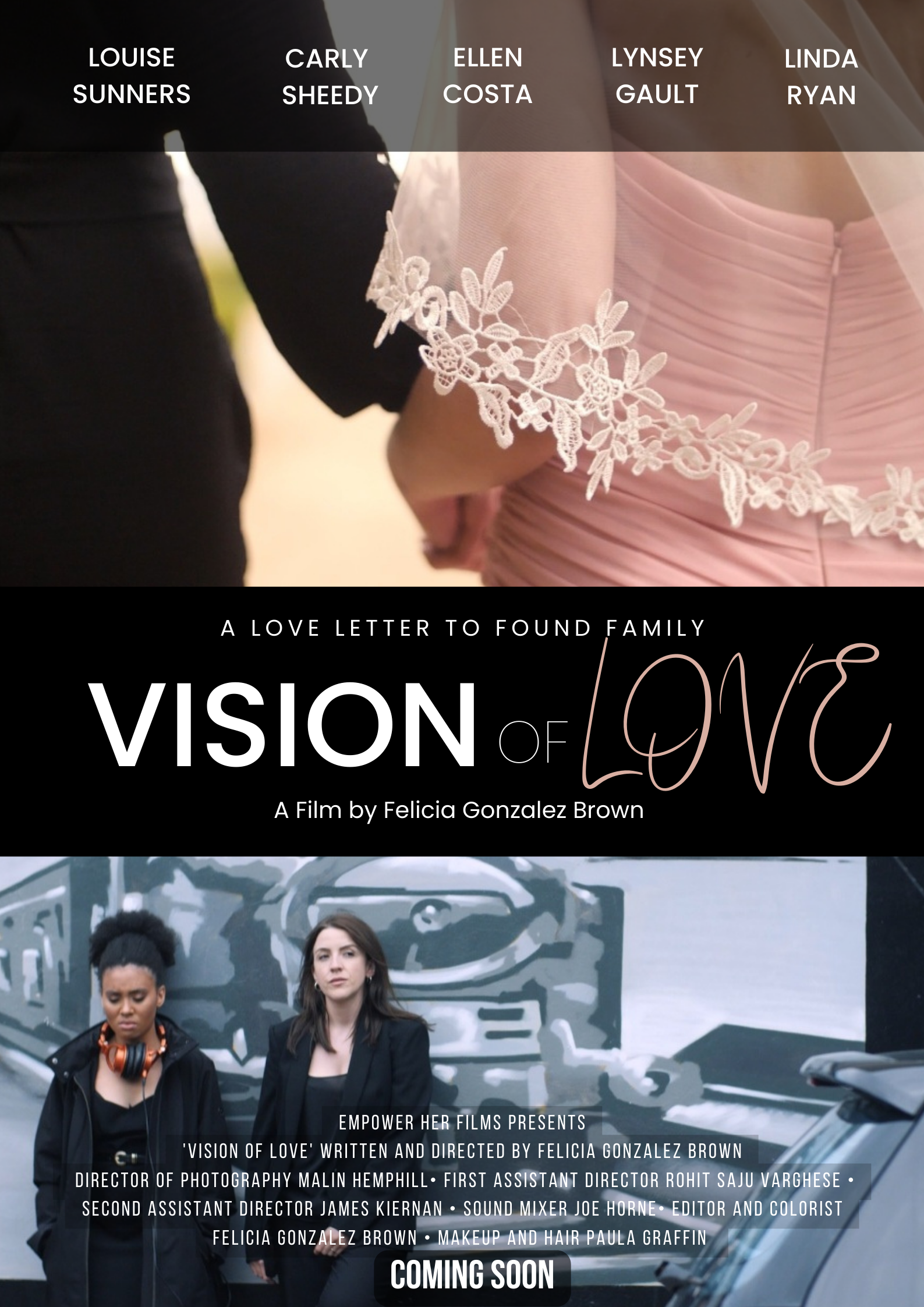
What are your ambitions with your project?
I'm eager to share this film with audiences. The desire that this film will find its way to the viewer who needs or wants to see it, that's been the goal.
Tell us something about your shooting? What pleasantly surprised you?
This film was shot within a Masters dissertation capacity for Queen's University Belfast, with resources that reflect such a budget, however, the talent of cast and crew were anything but amateur level. The calibre of the professionals that graced our set constantly surpassed my expectations. As stated, we had tight timelines, so it was extremely important that everyone was on their game. This was consistently the case, even factoring in the unpredictability of filming. Magic followed this production for sure.
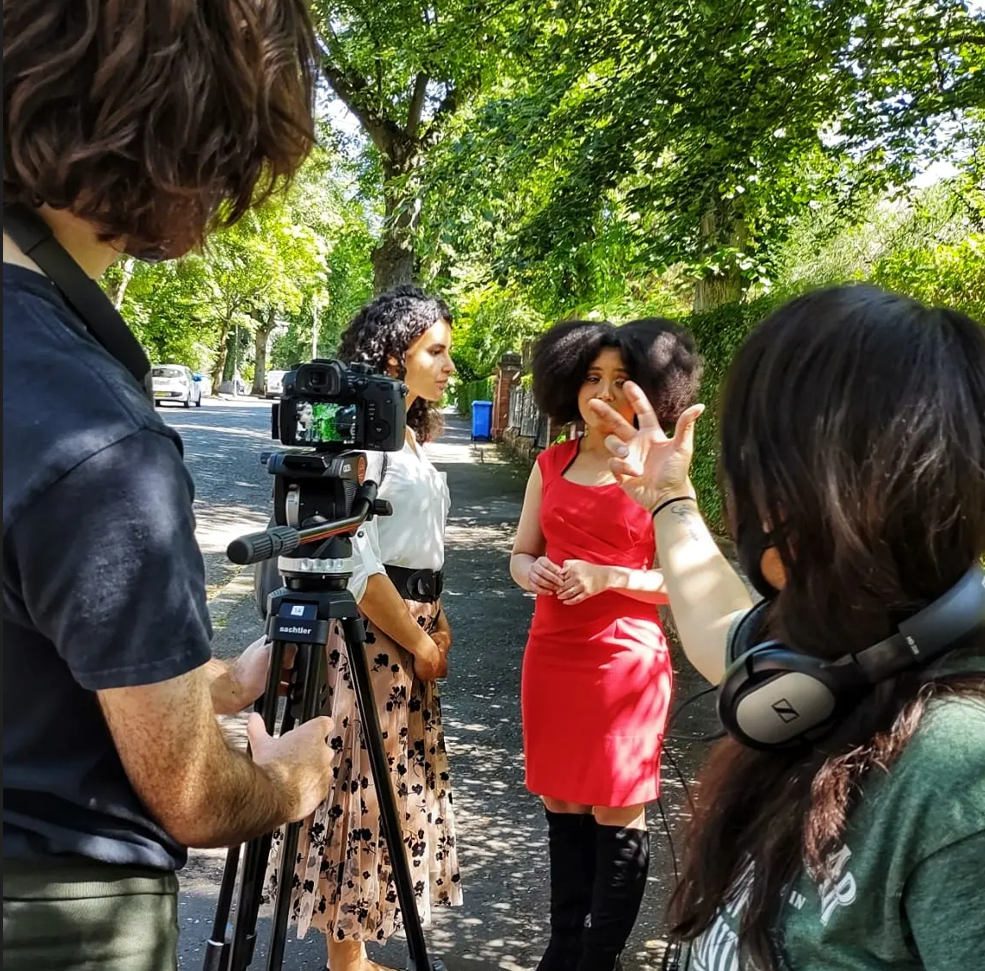
For what group of spectators is your film targeted?
The themes of Vision of Love are quite universal, and I believe many viewers will identify with some aspect of the narrative. However, by having an LGBTQIA+ protagonist, it is my aim to center the experience of those who often feel unseen.
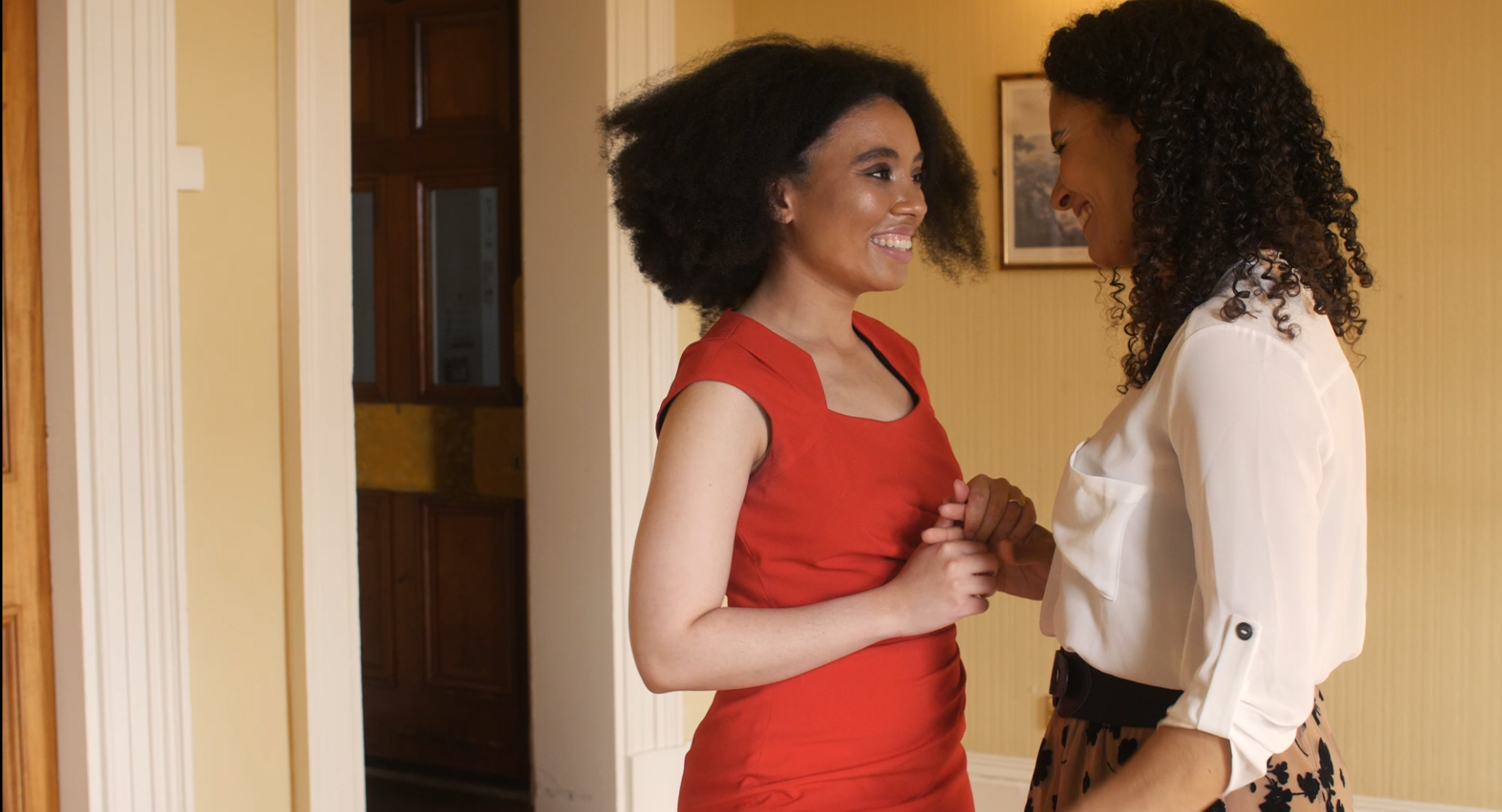
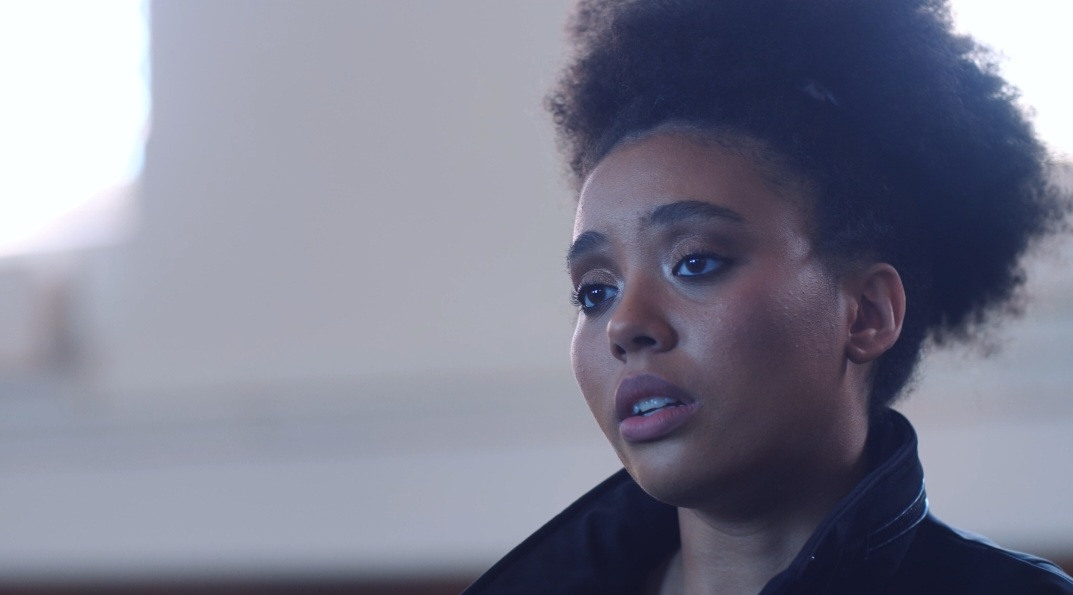
Why should distributors buy your film?
I believe Vision of Love represents the type of films that we need to be flooding theatres and streaming services with. Recentering narratives on characters that haven't traditionally been written with depth or as the main protagonist. Vision of Love's inclusivity makes it accessible to a wider audience, while providing joy and healing as its means of repeat viewer.
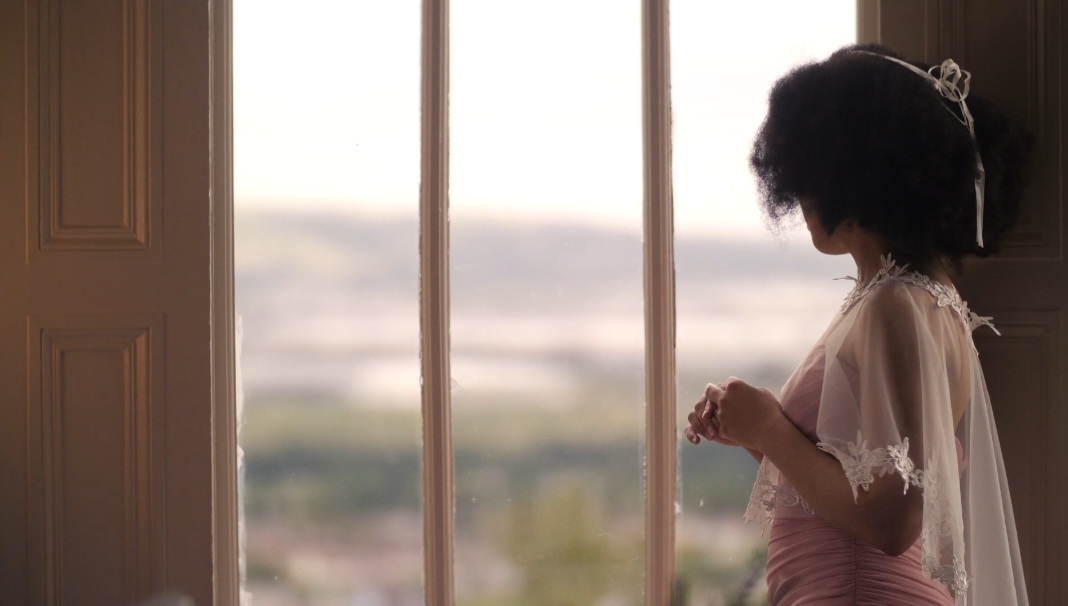
How would you specify your work?
My work investigates human connections and highlights underrepresented communities.
Why did you decide to become a filmmaker?
I began my career as an actor and found that the roles I was reading for were limiting to women and Latine. So, I began writing the stories I wanted to represent and the media I wanted to see. In addition to furthering diversity of representation via director's vision, I have a strong desire to improve production culture. As a director, I have the substantial responsibility of leading a healthy and respectful set by example and implementation of advocacy.
Who is your role model?
I am blessed to have many people I look to when I seek guidance. My father has been my steadfast supporter since the beginning. He has shown me how to dream big, pick myself up and dust myself off when I hit a hurdle and think outside of the box; all traits that have served me well as a filmmaker. My father was also the first person to introduce me to a diverse collection of film as a kid, and taught me the importance of seeing myself in media. My sister has pushed me to challenge myself past my comfort zone and to look for advocacy opportunities. My husband is the heart. I find ways to highlight passion and small, sweet moments, because of him. My kids have constantly influenced me to find the depth and ferocity in female characters and are constantly providing me with much-needed perspective. Lastly, someone I have reconnected with recently, is with my inner niña. She has guided my work to be more innovative and reminded me of my boundless capabilities.
Which movies are your favorites? Why?
I have a diverse taste in film, but in the end, if it makes me laugh or has Sandra Bullock in it, that's the one. The classics, or the ones most quoted in my circle would be Spaceballs, While you were Sleeping, The Lovebirds, Reality Bites. These films provide a 'feel good' viewing experience and wrap you in a blanket of joy. More recently I've been really impressed by how the lines of film and TV have blurred in shows such as Undone, A League of their Own and Stranger Things. Their innovative story-telling methods and inclusive narrative models are inspiring as well as their evocative composition.
Where do you look for inspiration for your films?
I live by the 'write what you know' mantra, in a modified manner. The 'feeling' is what I know, then it is imperative to bring more research and diverse experiences into the mix to fill out any story. This makes a story accessible and inclusive.
Which topics interest you the most?
Stories about friendship, family and healing interest me the most.
What do you consider your greatest achievement in your career?
Vision of Love provided me with high marks for my dissertation in a Masters of Arts in film. It was the final element of the culmination of my hard work in a laborious program and the most fulfilling achievement in my career to date.
What do you consider most important about filming?
The most important aspect of filming, on the contrary of what most may feel, is not story, though it is absolutely a priority. The utmost priority, in my opinion, is that the project is accessible and inclusive from pre-production till the audience enjoys it. This is something I am constantly trying to educate myself on and evolve with each production I direct. If a huge subsect of the world is continuously left out of media, what is the point?
Which film technique of shooting do you consider the best?
My aesthetic is intimate. I'm interested in capturing the small moments in life. My favorite lens by far is the 85 mm. The 85 gives a tight composition and a shallow depth of field to focus the audience's eye. Besides that, it depends on what the narrative requires. I enjoy challenging myself with new techniques, like a dolly zoom in Lapse (2022), or multi-cam in The Adventures of Firebolt (2022). In Vision of Love we leaned into adjusting the frame rate to capture the most joyful moments in Sonia's journey in slow motion.
What is your opinion about current filmmaking?
Current filmmaking is moving to be more inclusive, and I find that thrilling. Filmmakers are beginning to look more like the people who watch the films and I honestly think that's how society evolves. We have a ways to go, however I think we're on our way.
What can disappoint you in a movie?
I don't like to hear cast or crew were mistreated during a production. It puts me right off of a film immediately. Lazy casting (which usually stems from lazy direction) is another pet peeve of mine. Intentional advocacy throughout a production process improves the chances of these issues being minimal or even non-existent. Beginning with hiring writers with diverse backgrounds, experiences, and abilities to casting who are going to ensure an accessible audition room, to production and post where, for example, the knowledge of lighting and coloring all skin tones is imperative.
Who supports you in your film career?
I am incredibly blessed to have the most supportive family, friends and community. My husband is the most supportive person and has championed me in each iteration of my career. From directing and cinematography books as gifts to 'Sure, let's move to Northern Ireland so you can complete a Masters in Film!', he's been my rock and heart for 20+ years now. I am forever thankful for him.
What are the reactions to your film? (opinion of spectators, film critics, friends and family)
Thus far, Vision of Love has won Best Narrative and Best Duo at the New York Film Awards and was a Finalist at Top Shorts Film Festival as well as awards of recognition at IndieFEST Film Awards. We are incredibly excited to be screening in May at two film festivals and are looking forward to the feedback from those audiences.
Have you already visited any of the prestigious film festivals?
I'm all about festivals that promote diversity, inclusion, accessibility and community. Latina Independent Film Extravaganza! and Pride Film Fest are two festivals that promote that ethos and I look forward to sharing my art via their platforms in May. I have screened at different kinds of festivals in the past and I find that focusing more on sharing the work and less on the 'prestige' makes a more enjoyable festival run.
What are your future plans in your filmmaking career?
I will continue to share intimate stories and advocate for those who need a platform for representation. I look forward to fun, adventurous and innovative collaboration with other artists that keep balance at the forefront.
Learn more:
Vision of Love website: https://feliciagonzalezbrown.wixsite.com/visionoflove
IMDB: http://www.imdb.me/feliciagonzalezbrown
IG: https://www.instagram.com/feliciagonzalezbrown/
